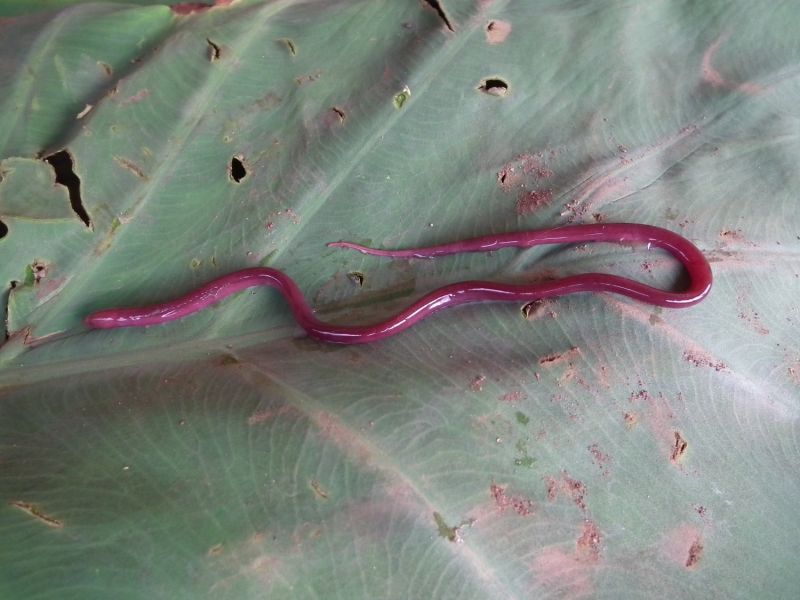Typhlosynbranchus luticolus
(Britz, Doherty-Bone, Kouete, Sykes and Gower 2016) Britz, Dahanukar, Standing, Philip, Kumar and Raghavan 2020

| ORDER | SUB-ORDER | FAMILY |
|---|---|---|
| Synbranchiformes | Synbranchoidei | Synbranchidae |
Synonyms
Monopterus luticolus Britz, Doherty-Bone, Kouete, Sykes and Gower 2016
Country
CameroonTypes
Holotype: BMNH 2016.7.6.1, 209 mm TL (incomplete, tail damaged). Paratypes: BMNH 2016.7.6.2, 167 mm TL (incomplete tail damaged), BMNH 2016.7.6.3, 158 mm TL, BMNH 2016.7.6.4-5, 164-203 mm, BMNH 2016.7.6.6, head missing but rest 115 mm, ZMUC P 9415, 120 mm TL.
Distribution
Dug up from sandy soil in farmland with banana and cocoyam crops and tree ferns and palm treesCameroon: Mundame, along river Mungo, near Kumba (4°33' N 9°31' E).
Habitat
The original description (Britz et al. 2016) has the following description: "All of the 2009, 2010 and 2013 specimens of M. luticolus were encountered during attempts to collect caecilian amphibians. They were dug from moist to wet soil (~ 0.3 m), usually inundated by the neighbouring water body. All these sites were immediately adjacent to both lotic and lentic aquatic habitats
Traditionally subterranean biologists have not considered the soil fauna as part of the subterranean realm and they have not studied it. However there are a number of similarities of habitat, especially darkness but also confined space analagous to interstitial habitats, and of evolutionary trajectories such as reduction in eyes and pigment and in body size (Culver and Pipan 2014:128-141). This species and Monopterus rongsaw are the only known soil dwelling fishes but there are 35 known species which inhabit the interstitial subterranean environment which is in many ways analagous. Both are shallow, dark and space limited (Culver and Pipan 2014:106-127) and if the two Monopterus species are compared morphologicall to the most exteme interstitial species many similarities can be noted. [See also Culver and Pipan (2008) and Pipan and Culver (2012) for discussions of shallow (or superficial) subterranean habiitats, SSHs].
Systematics
A member of the 'Amphipnous group' of Monopterus.
Conservation Status
[NE]
Museum Holdings
As above only.
Key References
- Rosen, D. E. and Greenwood, P. H. (1976)
- Culver, D.C. and Pipan, T. (2008)
- Britz, R., Lalremsanga, H.T., Lalrotluanga and Lalramliana (2011)
- Pipan, T. and Culver, D.C. (2012)
- Culver, D.C. and Pipan, T (2014)
- Britz, R., Doherty-Bone, T.M., Kouete, M.T., Sykes, D. and Gower, D.J. (2016)
- Britz, R., Sykes, D., Gower, D.J. & Kamei, R.G. (2018)
- Britz, R., Sudasinghe, H., Sykes, D. and Tharindu Ranasinghe, R.H. (2020)
- Britz, R., Dahanukar, N., Standing, A., Philip, S., Kumar, B. amd Raghavan, R. (2020)
| Rosen, D. E. and Greenwood, P. H. | Journal Article | 1976 | A fourth neotropical species of synbranchid eel and the phylogeny and systematics of synbranchiform fishes |
| Culver, D.C. and Pipan, T. | Journal Article | 2008 | Superficial subterranean habitats - gateway to the subterranean realm? |
| Britz, R., Lalremsanga, H.T., Lalrotluanga and Lalramliana | Journal Article | 2011 | Monopterus ichthyophoides, a new species of scaled swamp eel (Teleostei: Synbranchiformes: Synbranchidae) from Mizoram, India |
| Pipan, T. and Culver, D.C. | Book Section | 2012 | Shallow subterranean habitats |
| Culver, D.C. and Pipan, T | Book | 2014 | Shallow subterranean habitats: Ecology, evolution and conservation |
| Britz, R., Doherty-Bone, T.M., Kouete, M.T., Sykes, D. and Gower, D.J. | Journal Article | 2016 | Monopterus luticolus, a new species of swamp eel from Cameroon (Teleostei: Synbranchidae) |
| Britz, R., Sykes, D., Gower, D.J. & Kamei, R.G. | Journal Article | 2018 | Monopterus rongsaw, a new species of hypogean swamp eel from the Khasi Hills in Northeast India (Teleostei: Synbranchiformes: Synbranchidae). |
| Britz, R., Sudasinghe, H., Sykes, D. and Tharindu Ranasinghe, R.H. | Journal Article | 2020 | Ophichthys desilvai, a poorly known synbranchid eel from Sri Lanka (Teleostei: Synbranchidae) |
| Britz, R., Dahanukar, N., Standing, A., Philip, S., Kumar, B. amd Raghavan, R. | Journal Article | 2020 | Osteology of ‘Monopterus’ roseni with the description of Rakthamichthys, new genus, and comments on the generic assignment of the Amphipnous Group species (Teleostei: Synbranchiformes). |